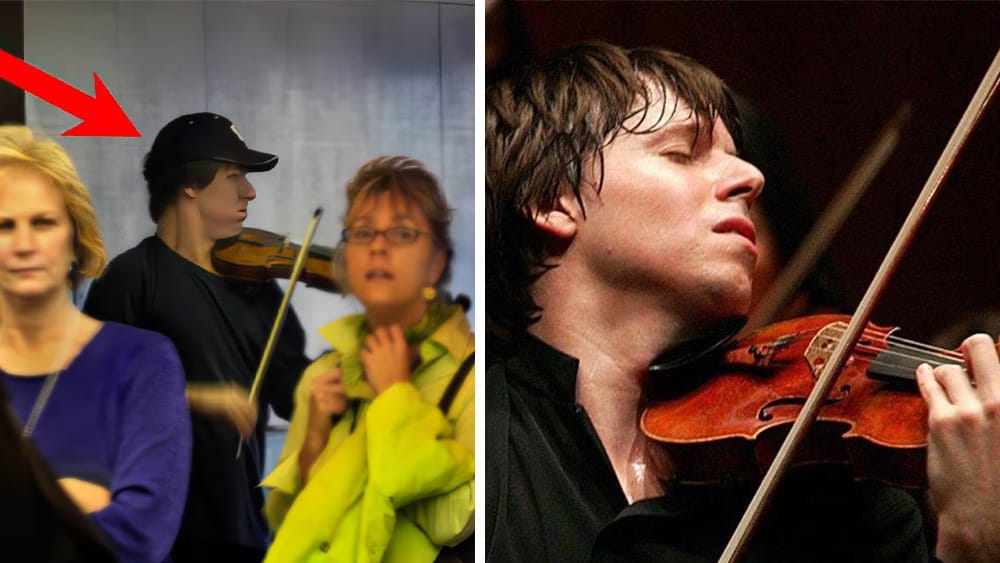In January 2007, world-renowned violinist Joshua Bell performed an impromptu concert in a Washington, D.C. subway station as part of a social experiment orchestrated by The Washington Post. Armed with his $3.5 million Stradivarius violin, Bell played some of the most intricate pieces of classical music during the morning rush hour at L’Enfant Plaza [[10]]. Despite his extraordinary talent and the priceless nature of his performance, only a handful of commuters stopped to listen. This experiment has since become a profound commentary on human behavior, perception, and how context shapes our appreciation of beauty.
The Setup: A World-Class Performance in an Ordinary Setting
Bell, dressed casually in jeans and a baseball cap, blended into the crowd as just another street musician. Over 45 minutes, he played masterpieces like Bach’s Chaconne, which typically captivate audiences in sold-out concert halls. Yet, in the bustling metro station, fewer than ten people paused to appreciate his music. Most walked past without a second glance, while others tossed loose change into his open violin case, amounting to just $32 in donations [[5]].
This stark contrast between Bell’s usual performances—where tickets can cost hundreds of dollars—and his near-invisibility in the subway raises fascinating questions about human psychology. Why did so many fail to recognize excellence when it was presented outside its expected context? What does this say about our priorities and ability to perceive beauty?
Key Learnings from the Experiment
1. Context Shapes Perception
One of the most striking takeaways is that context plays a pivotal role in how we perceive value and beauty. When Bell performs in prestigious venues, people pay top dollar to hear him play because they associate those settings with high artistry. However, in the subway—a space associated with mundane routines—the same performance went largely unnoticed [[3]].
This highlights how much our environment influences what we deem worthy of attention. It serves as a reminder that extraordinary things may be happening all around us, but if they occur in unexpected places, we might overlook them entirely.
2. The Power of Preconceived Notions
The experiment also underscores the impact of preconceived notions on our judgment. Commuters likely assumed that anyone playing in the subway was merely a struggling amateur or busker trying to make ends meet. Few would have imagined encountering one of the greatest living violinists in such a setting [[4]].
Our assumptions often act as filters, shaping what we notice and ignore. By dismissing the possibility of greatness in unconventional spaces, we risk missing out on moments of profound beauty.
3. Time and Attention Are Precious Commodities
Another critical insight is how modern life prioritizes efficiency over reflection. During rush hour, commuters were focused on reaching their destinations quickly, leaving little room for pauses or distractions. In today’s fast-paced world, slowing down to appreciate something—even something as sublime as Bell’s music—can feel like a luxury we cannot afford [[6]].
This tendency reflects broader societal trends where productivity often trumps mindfulness. We must ask ourselves: Are we too busy chasing goals to notice the extraordinary in the ordinary?
4. Recognizing Excellence Requires Awareness
True managerial talent lies in recognizing excellence regardless of context, as noted in a Medium article discussing leadership lessons from the experiment [[1]]. Similarly, in everyday life, being attuned to excellence requires intentionality. Those who stopped to listen to Bell demonstrated curiosity and openness, qualities essential for appreciating hidden gems in our surroundings.
By cultivating awareness and actively seeking excellence, we can enrich our lives and deepen our connections to the world around us.
Implications for Human Behavior and Thinking
The Joshua Bell Metro Experiment offers valuable insights into human behavior and thinking:
- We Underestimate the Impact of Environment: Our brains are wired to categorize experiences based on familiar patterns. When something deviates from these patterns—like a virtuoso performing in a subway—we struggle to process its significance.
- Beauty Is Often Overlooked in Familiar Spaces: The experiment reminds us that beauty exists independently of its setting. However, our ability to perceive it depends heavily on whether we’re primed to look for it.
- Mindfulness Enhances Appreciation: Slowing down and paying attention allows us to uncover hidden layers of meaning and joy in everyday situations. Without mindfulness, even the most remarkable events can pass unnoticed.
Final Thoughts: Don’t Be a Statistic
The story of Joshua Bell’s subway performance challenges us to rethink our priorities and sharpen our observational skills. As Karen Rought aptly put it, “Don’t be a statistic” [[4]]. Instead of rushing through life, let’s strive to remain present and receptive to the unexpected wonders that surround us.
Next time you find yourself in a crowded train station—or any seemingly ordinary place—pause for a moment. You never know; you might stumble upon a masterpiece disguised as the mundane.
Would you have stopped to listen? And more importantly, will you now?
Discover more from Pasindu Lakshan Perera
Subscribe to get the latest posts sent to your email.




